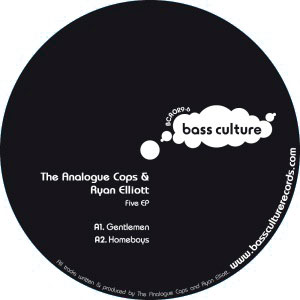The Analogue Cops, Ryan Elliott, and Alex Picone Five EP
The members of Berlin-via-Italy duo The Analogue Cops have made a name (or names, considering […]

The members of Berlin-via-Italy duo The Analogue Cops have made a name (or names, considering their list of aliases: Lucretio, Marieu, OCP, XENOGEARS) for themselves off a very rudimentary take on dance music. Many of their releases, especially earlier editions on their own Restoration label, seem to have been jammed out in one try, reveling in the imperfection that approach brings. While this rawer take has lately become quite trendy, it has also birthed plenty of productions that simply need more work, or more artistic consideration. Perhaps to combat this problem, The Analogue Cops have become frequent collaborators, recording with Steffi as Third Side and Blawan as Parassela. Five, the pair’s first release for the diverse Bass Culture imprint, finds the duo reuniting with Ryan Elliott (who appeared on 2011’s Big Family EP) for a side, and then—somewhat surprisingly—meeting with fellow Italian Alex Picone, best known for his releases on Cadenza, on the flip. The results are still dominated by The Analogue Cops’ rough methods, but Elliott and Picone each manage to at least subtly influence their sound.
“Gentlemen,” which opens the Ryan Elliott side, is a fitting—if trying—introduction, based around a sample of a man announcing, “gentlemen please take your marks.” The track scrappily builds to a string-led crescendo, but the pervasive sample distracts, keeping it firmly in DJ-tool territory. It concludes on an oddly emotional note, as the sample shifts to a resigned, “I don’t know what to believe in anymore,” a downcast conclusion for such an insistent track. “Homeboys” also repeats a vocal sample, but it’s buried deep enough to be unintelligible. This gives its repeating organ and siren-like string motifs some leverage—at points, they’re ripe with tension—but the track’s overall effect is fairly modest.
Alex Picone may not be as precise as other artists to have released for Cadenza, but his productions are still quite polished in comparison to those of The Analogue Cops. In collaboration, Picone’s instincts for organization shine through, and the side is less muddy and more purposeful than much of the duo’s work. This means there are no accidental epiphanies, but the tracks succeed all the same. On “No Stress,” a tight interplay between layered organ and cowbell coasts along, perennially hiding and then blossoming again. “Out of Passion,” meanwhile, has a tough sense of purpose, as the trio allows corroded stabs to emerge out of rippling jack patterns. The side is still firmly in the tracky, tool category, but shows The Analogue Cops’ approach to be adaptable to smoother, seemingly more plotted-out results.

